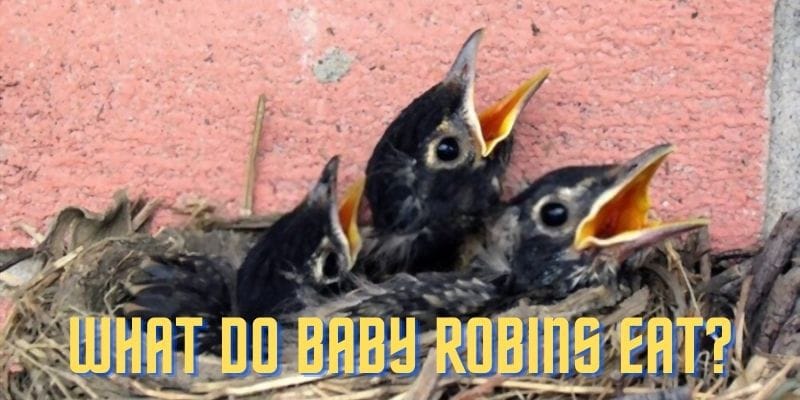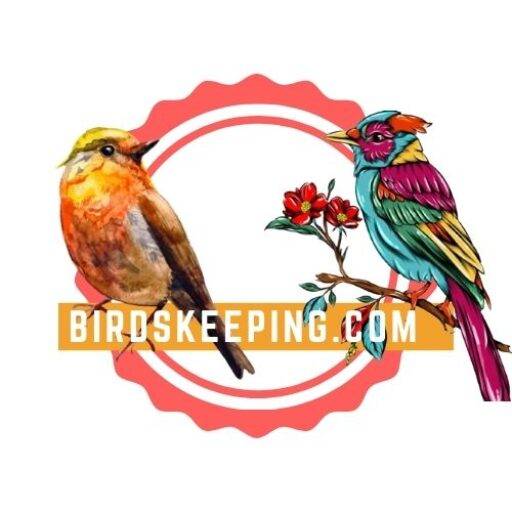Baby birds are usually not capable of eating anything as adult birds eat. Adult birds can eat fruits, insects, and other foods which most birds and robins eat. As the baby robins can not eat all the foods that adult robins eat, what do baby robins eat?
Their food selection is very balanced, and baby robins can eat crickets, bugs, beetles, tiny cockroaches, etc.
But you should take care of their feeding if you bring baby robins to your home. There are different stages of their eating behavior, from newborn to mature.
Table of Contents:
- Diet Of Baby Robins
- What Do Baby Robins Eat When They Leave The Nest?
- What Do Newborn Baby Robins eat?
- What Do Baby Robins Eat In The Winter?
- Best Foods For Baby Robins
- What Do Baby Robins Eat Besides Worms?
- Final Thought
Diet Of Baby Robins
Robins differ from other birds such that they do not eat bird food and instead eat invertebrates such as insects, nuts, and strawberries. One may feed baby robins at the house until they are old enough to care for themselves.

A baby robin’s dietary food is varied and well-balanced. Robins feed their small juvenile birds with crickets, beetles, and bugs besides larvae.
Can Baby Robins Eat Mealworms?
Baby robins grow rapidly and only remain in the nest for two weeks (14 to 16 days) until they can walk out on their own.
Mother robins follow their babies around as they will try to drive. Some kinds of food that are useful for robins are.
- Nutrition, fat, starch, nutrients, and resources must be soft, wet, and semi-liquid.
- Dried, rolled oats with water (not milk!) – Carbohydrates, protein, and fat.
- Add a boiled egg (1/4 teaspoon per tablespoon of oatmeal); after all, that is what the bird ate until it landed – carbohydrates, sugars, enzymes, and minerals.
- Try to feed them any larvae or bugs (a tiny scarab beetle, cockroach, or grub – no ants, bees, wasps, or beetles).
What Do Baby Robins Eat When They Leave The Nest?
Baby robins can walk after two weeks of birth until they must remain in the nest. If a baby robin or orphaned baby robin will leave the nest or leave alone before the age of two weeks, it will almost certainly die.
Following are some things to remember if you find a wounded baby robin, even during a flight or some other occasion.
If you come across a baby robin that has fallen out of its nest, try to return it to its nest if it is possible.
If you are not able to find the nest, bring it to your home. Keep feeding the baby robin until it learns to hunt for food on its own.
It usually happens one to two weeks after the baby is born. Worms and fruits such as Blueberries, oranges, and cherries, can be given to them in tiny pieces with the
The strawberries and grapes may be consumed by baby robins later in the day, at the end of their feeding period. They may also eat berries and fruits, earthworms, worms, and larvae.
Enable the bird to feed by placing these things on the ground. Enable the baby robin to find its own way after this.
If I left a parentless baby robin before the age of two weeks, it is unlikely to survive. Robins are unlike other birds.
They never eat bird food; they eat invertebrates such as grubs, vegetables, and berries as their primary source of nutrition.
As a result, feed them until they can care for themselves. If it is a nestling, feed termites to baby robins.
What Do Newborn Baby Robins eat?
A diet comprising moistened fruit of hard-boiled eggs and 20% mealworms is a good starter diet for a newly hatched altricial bird (which can be purchased online).
Water can be added to the kibble until it reaches a gel texture, but the baby bird drowns not that much. The grub worms and hard-boiled eggs should be cut into small bits that the baby bird can eat.
Water should not be supplied to birds directly because the fluid will fill their respiratory system for them to drown.
You should give them water when they are old enough to jump around the box. Place deep containers (such as jar plastic covers) into the box at this stage, and the bird will drink from them.
It would be best to fill the water container with a stone or a bunch of marbles to keep the bird from standing in it.
If you suspect a baby bird is drained, take it to a veterinarian or a bird’s wildlife rehabber who can administer fluids to the bird.
What Do Baby Robins Eat In The Winter?
Frozen or fresh fruits can offer baby robins to eat during winter. Scatter apple slices, raisins, blueberries, strawberries, raspberries, or cherries can offer on the grass.
Bird feeders are unlikely to attract robins. Robins discover that fruit grows on trees and shrubs when they are young, and they do not think they will be able to find it somewhere else! Even in the dead of winter, robins need water.
What Do Robins Eat In The Winter?
Thirsty birds can consume snow when water supplies are frozen. When the temperature rises above 10°F, put out a shallow water tub.
When it gets colder, the steam from freezing water coats the bird’s feathers in ice, preventing them from flying. Winter robins consume berries and other fruits and vegetables.
Best Foods For Baby Robins
The best food that you can give to your baby robin as food is listed below.
- Snails or Grub worms.
- Crickets are a type of insect that lives in.
- Beetles are a type of grasshopper.
- Waxworms or Brine shrimp.
- Dry cat food that has been drained or processed.
- You can also try the following foods.
- Dog or cat kibble that has been moistened.
- Moist dog meals.
- Dog cookies that have been moistened.
- Liver in its natural state (except seasoning).
- hard-boiled eggs.
What Do Baby Robins Eat Besides Worms?
A robin’s usual diet comprises 40% bugs and 60% fruit and vegetables, including common foods like Microbes, predatory insects, worms, centipedes, and snails.
Do Robins Eat Bird Seed?
These are some creatures that you can find in the garden. Spiders, beetles, grasshoppers, termites, crickets, and other insects are among the insects that can be found for robins.
Besides domesticated grapes, strawberries, cherries, winterberries, cedar, and lavender, are good for baby robins.
Besides these foods, I have observed American robins consuming larvae, tiny insects, snakes, salamanders, and freshwater animals, depending on their forage for food location and prey.
Final Thought
Feeding baby robins is not an easy task. So, whenever you see baby orphans or baby robins, you should try to find a baby robin’s nest, and if you cannot find them, bring them to your home.
Feeding baby robins is a crucial part of their care at home. There may be many doubts about what baby robins can eat and what you should avoid offering them for eating. So, the post will help you to feed baby robins.
Follow me on
Birdskeeping is supported by its readers. When you purchase through links on our site, we may earn an affiliate commission. Also, as an Amazon affiliate, we earn from qualifying purchases without costing you extra.

